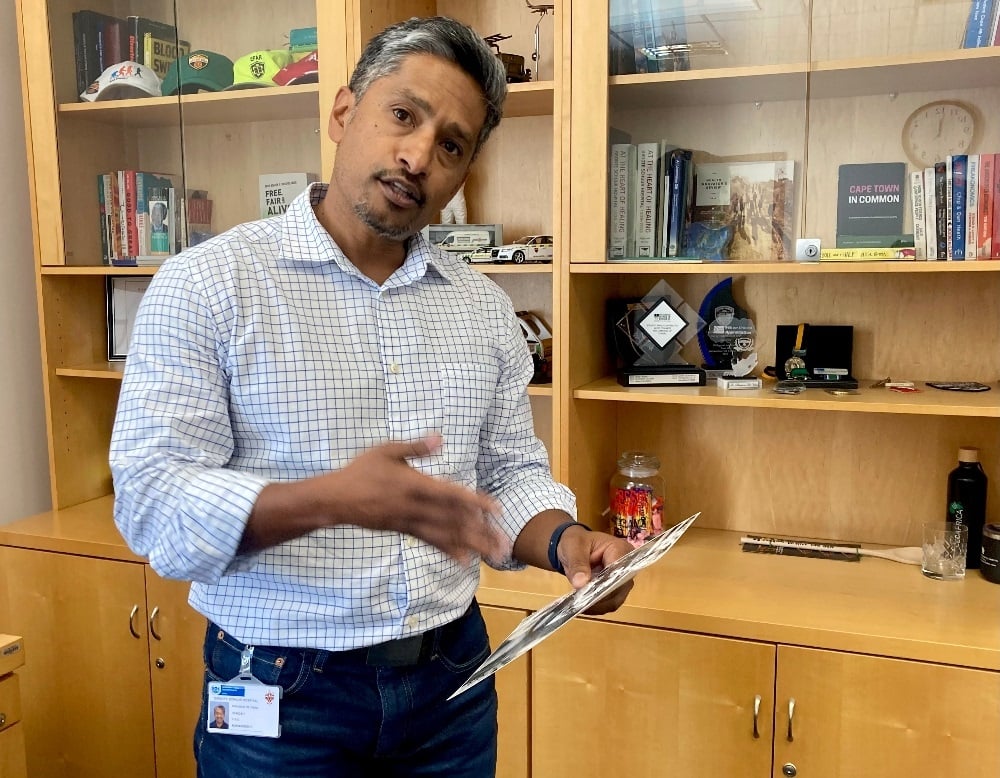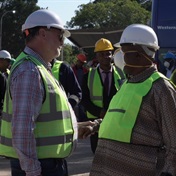
- From Antarctica to Haiti, to red zones in Cape Town, Dr Shaheem de Vries is accustomed to getting his hands dirty while saving lives.
- De Vries is the CEO of Groote Schuur Hospital and promises to bring a healthy dose of optimism to the job.
- With 970 beds against the slopes of Table Mountain, the iconic hospital is a beacon of hope, with sick people travelling from far and wide for specialised treatment.
As he inherits the reigns of Cape Town's cutback-riddled healthcare mammoth - Groote Schuur Hospital - Dr Shaheem de Vries offers a dapper smile and a dose of optimism.
CEO of the University of Cape Town-linked tertiary hospital since February, De Vries brings to the table a reputation for quick thinking and two decades on the emergency medicine beat, including 10 years as a "head cowboy".
Before taking over at Groote Schuur, he headed the Western Cape's Emergency Medical Services, instilling in its 2 000 staff the galvanising mantra of "we are the heroes, the cool kids, the cowboys" - a narrative intended to spark morale and respect as rescue workers risked their own lives driving ambulances into violent Cape Flats suburbs known as red zones.
Speaking from his new office - inside the hospital's turreted Old Main Building - De Vries reflects: "My emergency staff were targeted because that's what happens in these communities.
"And so, you can't go into that community and say: 'you know, you must protect us'. They can't even protect their own granny going to collect her pension, let alone an ambulance."
READ | New Groote Schuur Hospital CEO, Dr Shaheem de Vries, is 'ready to serve'
Among other qualifications, he attended medical school and completed an MBA degree, both at UCT.
Recalling key challenges in his career, such as supporting healthcare workers entering red zones, his speech is peppered with business textbook talk - like "navigating the organisation through that complexity".
This is offset by personable observations, such as when he first joined emergency services in 2003.
"I was now with the cool kids, the cowboys; wearing jeans and blue shirts and fire boots, and with that sense of humour of a subculture. It was a completely different environment to hospitals; helping people on the streets, in shacks, you know, in their homes."
Back in the executive corridors of Groote Schuur, a slew of complexity awaits his navigation.
With 970 beds against the slopes of Table Mountain, the iconic hospital is a beacon of hope to many, with sick people travelling from around the province and country for specialised treatment.
History has unfolded within these walls.
Past famous patients include struggle hero Robert Sobukwe for lung cancer, and apartheid prime minister HF Verwoerd after being stabbed at Parliament (he was pronounced dead on arrival).
Downstairs from De Vries' office, a museum commemorates the world's first successful human heart transplant performed on the premises by Professor Christiaan Barnard in 1967.
Catastrophic budget cuts
But the historic hospital is under pressure.
In February, senior Groote Schuur staff - including Professor Lydia Cairncross, the head of surgery, and Professor Ntobeko Ntusi, the head of the department of medicine - spearheaded a petition to national and provincial treasury, decrying "catastrophic budget cuts" and "crippling austerity"; saying how distressed clinicians, with multiplying work hours, are watching patients grow increasingly ill as waiting lists for lifesaving elective surgery grow longer.
Seated at a small boardroom table in his office, De Vries concedes last year R200 million was shaved off the hospital's budget.
He responds to these challenges in level tones, placing focus on what is at hand instead of that which was taken away.
He says:
"We've got frozen posts, and staff are really stretched at the moment. But we still have a R3 billion budget. We still have 3 700 people; or well 3 500 people now - recently less 200. So, for me, the thing is not so much what we've lost, but what is still possible."
To cut or not to cut
Notwithstanding widespread concerns about further cuts, De Vries holds onto optimism.
"I don't think that my option is to cut or not to cut [elective services as it stands]. The optimistic way of looking at things means that I won't easily accept a binary choice."
He insists on "engaging with all the stakeholders in the ecosystem, to find ways to optimise what we have to offer".
Tough conversations are to be had around an opportunity cost, he adds.
"The clinicians here [at Groote Schuur], they believe they can save every life. But the question is, should they? We also have to ask, at what cost?
"And so, I think those conversations about at what cost do we pursue saving a life become compelling, because it comes at an opportunity cost for another patient. It comes at a very real economic cost for the system."
READ MORE | Boosting healthcare efficiency: Mitchells Plain facility eases pressure on state hospitals
Our conversation turns to triage. These are models for determining orders of priority for treating patients, to use limited resources to those who stands to benefit from them the most.
Triage is a long-standing topic of interest for De Vries - he co-authored a paper titled The Cape Triage Score - A triage system for South Africa, published in the South African Medical Journal in 2006, outlining a triage model for use in emergency units countrywide.
A resilient health system
"Triage is applicable when demand outstrips the available resources, right? And in the health system in South Africa, that happens every day," he says.
"Our ambulance waiting times, our surgical backlogs; in many other systems or countries, these would be considered major incidents.
"So, a health system like ours actually is a resilient health system, we saw that in Covid, when we outperformed many, much better resourced countries… We might not have a lot of resources, but we have a lot of resourcefulness."
On a bookshelf in De Vries' office, a trophy is marked: "University of Cape Town Graduate School of Business: student who contributed most towards the learning of others."
Despite such accolades, he has a self-deprecating bent, referring to himself as a mediocre student at medical school, saying:"I was comfortable with the chaos; I was comfortable making high value decisions with very little information. Suddenly guys who were the smartest in class were coming to me for advice. And then came the realisation that it's not just about the knowledge, but also about how you think."
The eldest sibling, De Vries - his father worked as a builder then a quantity surveyor, and his mother a teacher - matriculated at South Peninsula High School in Diep River.
ALSO READ | From humble beginnings to being the first African winner of prestigious surgery award
"I did not want to squander my matric, my good grades so I guess medicine was just the thing to do," he says.
It was his wife Layla, an occupational therapist, who discouraged him from dropping out of medical school.
"I thought about stopping [medical school] in my third year, in my fourth year and in my sixth year. I enjoy drawing and was drawn to architecture, the creativity. But I'd gotten married in my fifth year, and my wife said to me: just see it through."
'I look like James Bond'
These life choices appear to have served him well. His face lights up discussing memories on the job. There was the mission to Antarctica in a chartered jet to save a Norwegian researcher in 2012; five years later he found himself on the Nile in a riverboat ambulance, sirens wailing.
"I have a picture of that," he says, laughing.
"I look like James Bond".
In 2010, De Vries joined humanitarian organisation Gift of the Givers in Haiti, following the earthquakes there. This inspired him to co-author an editorial called Haiti Disaster Tourism - A Medical Shame.
"Haiti was difficult and made me realise that there has to be ethics that govern a rescue response," he says.
"To protect that community from being exploited by film crews and news broadcasts and clinicians who don't practice in that environment.
"The difference with Gift of the Givers was that they were ingrained in the community. We were driving on the back of bakkies - pickup trucks - driven by nuns. Meanwhile, the US were getting around in tanks and armoured vehicles…"
READ MORE | 'This is a dream': Groote Schuur nurse aims for Mrs SA title
He says the fastest he has driven an ambulance is 200km/h: "But that's illegal now. There was a shift; In 2010, we changed our approach to driving.
"Driving that fast is dangerous but also we had so many accidents which were costing us. An ambulance costs about a million rand to put on the road. And if you have an accident; not only is it the repairs, but also the opportunity cost of having one less ambulance on the road.
"So, now staff pay their own speeding fines; the only fine we will cover is going through red lights, because that you can do safely."
Outside of leading healthcare teams, De Vries is a runner and a cyclist. He can also be found alongside school sports fields embarrassing his son and daughter, he says.
Meanwhile back at the executive offices at Groote Schuur, just over two months into his tenure, he possibly faces his biggest leadership challenge yet - as peers look to him to translate optimism into strategy.
*This story was published by Spotlight - health journalism in the public interest. Sign up to the Spotlight newsletter.



 Publications
Publications
 Partners
Partners























